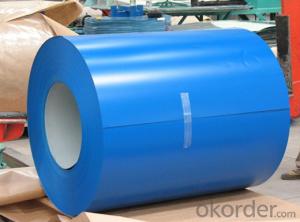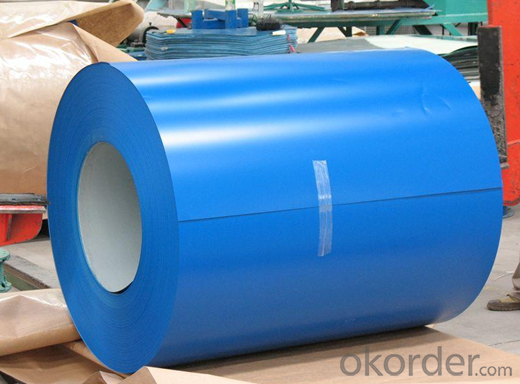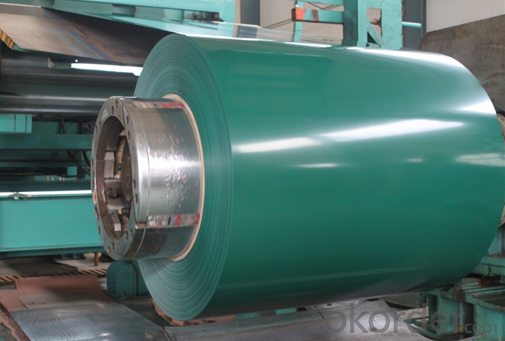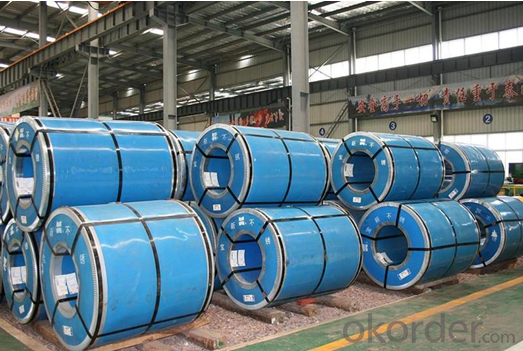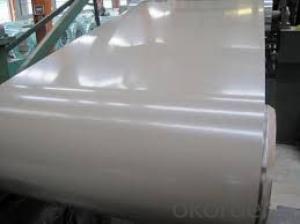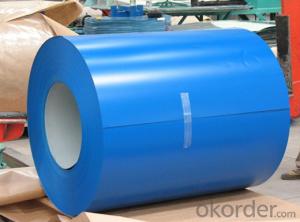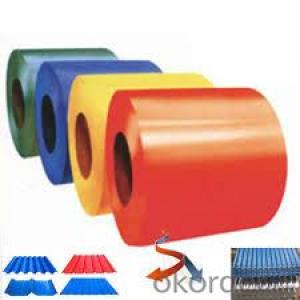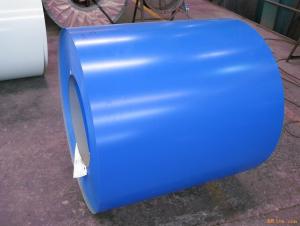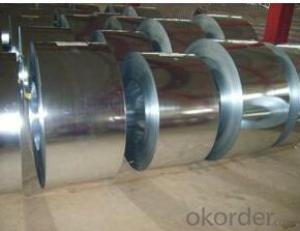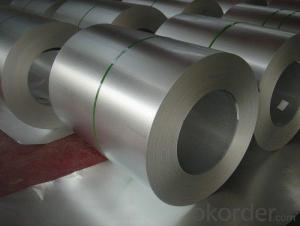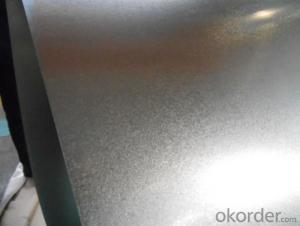Hot-Dip Galvanized/Aluzinc Steel/Manufacturer Pre-Painted Steel Coil for Building
- Loading Port:
- China main port
- Payment Terms:
- TT OR LC
- Min Order Qty:
- 50 m.t.
- Supply Capability:
- 1000000 m.t./month
OKorder Service Pledge
OKorder Financial Service
You Might Also Like
Specification:
1) Standard: JIS G3302-1998/EN10142/ASTM A653/ASTM A792/ AISI/BS/ DIN/GB
2) Grade:DX51D+Z
3) Thickness: 0.12mm-0.6mm, all available
4) Width: 600mm-1250mm, all available
5) Length: according to the customer's request
6) Coil ID: 508/610mm
7) Hardness:Soft,full hard
8) Zinc Coating: 50-150g
9) Paint coating: Top 15-20mirco ,back 7mirco
10) Color series: Sea blue,white grey and all RAL color
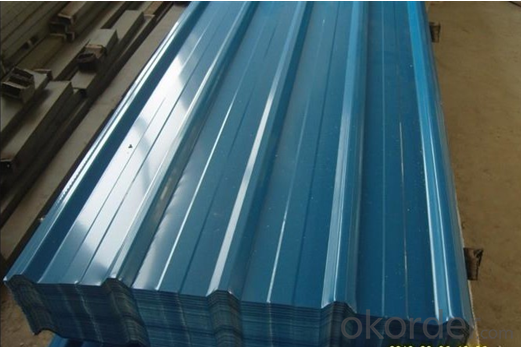
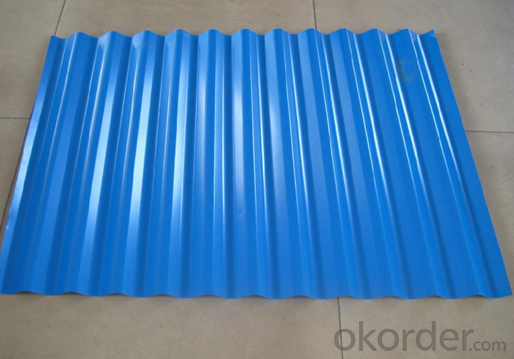
PPGI,(PPGL,pre-painted galvanized steel coils, pre-painted galvalume steel coils,color coated steel coils.color coated galvanized steel coils)
1, Introduction: PPGI is made of galvanized steel coils or galvalume steel coils with polymer coatings as surface. It's a new enclosure material and building board
2, Product feature: Apperance of a variety of color Antirust and antiseptic,durability,etc.
3, Production Process: Pretreatment(Degreasing) DryingChromatingPaint Basic OilCoolingDryingColor CoatingCoolingFilm- coveringRolling Up
4, Application: it is ideal for a wide range of applications,, such as pre-engineered buildings, architectural panels, roofing, siding, cladding, and many other building components.and also used back plate of appliance; wide range of construction, furniture industry, transportation industry, etc.
FAQ
1.What's your MOQ?
25MT, it is for one container.
2.Do you have QC teams?
Yeah, sure, our QC team is very important, they will keep the quality control for our products.
3. What's your normal delivery time?
Our delivery time about 10-20days for standard sizes, if you have other requirements like hardness and width ,it is about 20-40days. But don't worry ,we also try our best for the delivery time ,because time longer and our cost is higher.
- Q: What are the different types of steel coil welding methods?
- There are three main types of steel coil welding methods: butt welding, lap welding, and flash welding. Butt welding involves joining two ends of steel coils by aligning them and welding them together. Lap welding, on the other hand, involves overlapping the ends of the coils and welding them together. Flash welding is a method where the ends of the coils are placed in contact with each other and a high electric current is passed through them to create a weld.
- Q: I'm currently in an Estimating and Bidding class. I have to estimate two divisions for a multi-million dollar project. The project that I chose is around 6 million dollars and involves constructing a new gas/lighting building. I chose to estimate steel, and my question is, around how much out of the 6 million goes toward just the steel estimate? If it helps, this building is has two floors and is roughly about 100x70 feet. The building not wood construction, but rather steel and brick. How much of that 6 million would go into the steel? I'm not looking for anything exact, just roughly.
- It is not clear what stage this project is in. Is it preliminary or has a detailed design been done. It is also not clear if this is only the steel material or does it include the labor as well. A rough guess using a percentage of the total cost is okay if you have historical data to help you. If you have a detailed design then the percentage method should only be used as a check on a detailed cost estimate developed from the plans. If you plan to use numbers provided by someone here on Answers I would hardly call that an estimate.
- Q: How are steel coils used in the manufacturing of mining equipment?
- Steel coils are used in the manufacturing of mining equipment for various purposes, such as forming the structural components, building frames, and creating durable and robust machinery. These coils are often shaped, cut, and welded to construct mining machinery that can withstand the harsh conditions and heavy-duty operations in the mining industry.
- Q: Can steel coils be coated with anti-slip materials?
- Yes, steel coils can be coated with anti-slip materials. These materials can provide additional friction and grip to prevent slipping and sliding during transportation or handling.
- Q: How are steel coils stored?
- Steel coils are typically stored in warehouses or outdoor yards. They are usually stacked on top of each other, either horizontally or vertically, with wooden or steel dunnage to prevent damage and ensure stability. Coils may also be stored on specialized racks or on coil cradles. Proper spacing and organization are crucial to facilitate easy access, minimize the risk of damage, and ensure efficient inventory management.
- Q: How are steel coils used in the manufacturing of automotive bodies?
- Steel coils are used in the manufacturing of automotive bodies as the primary material for forming various structural components, such as body panels, frames, and reinforcements. These coils are typically fed into stamping presses, where they are shaped and cut into the desired shapes and sizes. The strength and durability of steel make it an ideal choice for automotive bodies, providing a solid foundation for safety and structural integrity.
- Q: How are steel coils made?
- Steel coils are made through a process called hot rolling, where a large slab of steel is heated and passed through a series of rolling mills to gradually reduce its thickness and shape it into a coil.
- Q: What are the advantages of using steel coils over other materials?
- There are several advantages of using steel coils over other materials. Firstly, steel is highly durable and has a long lifespan, making it ideal for various applications. Secondly, steel coils have excellent strength and can withstand heavy loads and extreme weather conditions. Thirdly, steel is recyclable and environmentally friendly, ensuring sustainability. Additionally, steel coils provide superior corrosion resistance, reducing maintenance costs. Lastly, steel offers versatility in terms of customization, allowing for various shapes, sizes, and thicknesses to meet specific requirements.
- Q: What are the different types of steel coil leveling methods?
- There are several different steel coil leveling methods, including roller leveling, stretcher leveling, and temper leveling.
- Q: How are steel coils stored in warehouses?
- Steel coils are typically stored in warehouses by stacking them securely on top of each other, either directly on the warehouse floor or on specially designed racks. They are often stored vertically to save space and ensure stability. Additionally, to prevent damage and corrosion, steel coils are often wrapped in protective materials or placed on pallets.
Send your message to us
Hot-Dip Galvanized/Aluzinc Steel/Manufacturer Pre-Painted Steel Coil for Building
- Loading Port:
- China main port
- Payment Terms:
- TT OR LC
- Min Order Qty:
- 50 m.t.
- Supply Capability:
- 1000000 m.t./month
OKorder Service Pledge
OKorder Financial Service
Similar products
Hot products
Hot Searches
Related keywords
